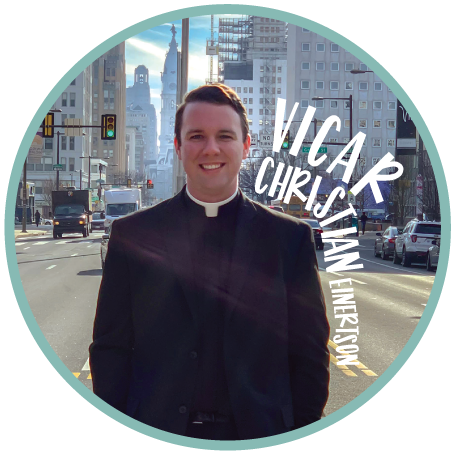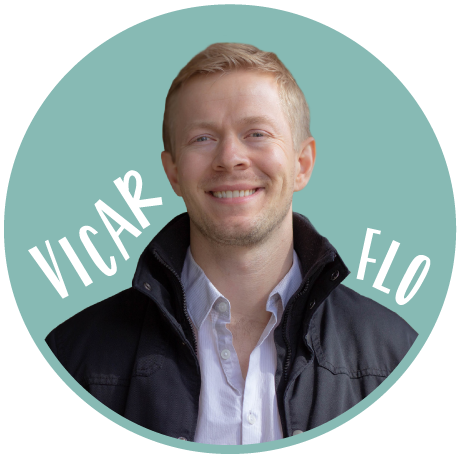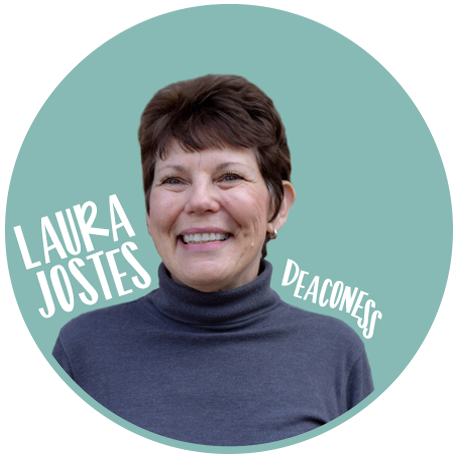
Concordia Seminary Newsroom
Three paths, one purpose

by Sarah Maney
At Concordia Seminary, students’ preparation for ministry includes real-world experiences — rubber-meets-the-road types of encounters. Through vicarages, internships and field work, students go beyond the classroom.
Sharing Jesus in the City of Brotherly Love
The rumble of the subway underscores the beauty of the Divine Service at Logos Lutheran Church. Smack dab in Center City — the Philly name for downtown — people of all ages and walks of life gather for worship, waiting to hear God’s Word proclaimed.
As an outreach of Philadelphia Lutheran Ministries (PLM), Logos is the first Lutheran Church—Missouri Synod (LCMS) church ever in Center City. With 1.5 million people, Philadelphia is the nation’s second-most populated area, just behind Manhattan, N.Y.

“We just started having services,” says Christian Einertson, who is currently serving as vicar at PLM. “As the only LCMS presence here, it’s much like a Lutheran embassy.”
Teeming with new experiences, Philly is different from his hometown of Marietta, Ga. Christian has met a great variety of people during his vicarage at PLM. He’s built friendships with people of vastly different backgrounds — friendships that have led to witnessing opportunities, like the Turkish woman dealing with the death of a loved one. Or the Russian Jewish student who wanted to talk about the Torah — and Jesus.
“I often meet with people in rough straits,” says Christian. “A lot of people here live in hard socio-economic conditions.”
Christian has also had “the wildest” opportunities to talk faith with students — including joining classes in the German department at Temple University to singing in a choir at University of Pennsylvania.
“It’s a matter of continuous witness, of engaging with the people before you, of trusting that the Word is going to work,” Christian remarks. “I’ve learned that God’s timeline is not my own. We have quite a few people who just show up at church, seeking to know what ‘this Lutheran stuff is all about.’ For example, someone showed up at church more than a year ago and is just now starting to consider to become a member. Our culture struggles with waiting — and having patience.
“The Word will not return empty,” reflects Christian. “No matter what, God’s Word is going to accomplish His purpose. It’s truly not by our own efforts, but only through the faithful preaching of the Word of God — whether you are in a
cornfield or in the heart of Philly.”
Vicar to the Dominican Republic
A “preacher’s kid” from DeSoto, Mo., Paul Flo is about as studious as they come, with an educational repertoire that includes pre-med classes at Saint Louis University, a degree in psychology from University of Missouri and a Master of Education from University of Hawaiʻi. Paul was introduced to the world of education through the organization Teach for America where he taught math and science for upper elementary in Hawaii.
“I realized that I loved teaching, but I wasn’t teaching the thing that I’m most passionate about: theology,” says Paul. During a third year of teaching in Malaysia with the Fulbright program, Paul decided to return to St. Louis to attend Concordia Seminary.

Originally he thought he’d come to the Seminary to get another master’s degree — he didn’t consider the Master of Divinity because he didn’t want to be a pastor (or so he thought). It didn’t take long for his feelings to change.
“In a short time, I realized that this was what I needed to be doing, I loved it and I still do.”
During Paul’s field work, one of his pastors asked if he would be interested in an international vicarage in the Dominican Republic (DR).
The main draw for Paul was practical: Two years of learning from a team of pastors rather than one — and he could pick up Spanish which would be helpful when he returned to the United States.
Paul knew there would be obstacles. With only a few remembered words of Spanish from his high school years, it was a “total immersion” learning experience.
“While I was in Santo Domingo, a couple of missionaries left to attend Seminary and my supervising pastor returned to the States for “home service.” I could no longer ‘hide behind’ them. I just had to jump in. I was preaching and teaching in Spanish before I knew it.”
Paul was also gaining the crucial core skills developed during a more traditional vicarage. He was learning the routine of church services, teaching Bible study, exploring the aspects of church planting and gaining experience with team dynamics. He was in the DR during the opening of a new seminary. Overall, Paul discovered the importance of listening and observing.
“I began to learn how to navigate the cultural differences,” says Paul. “For example, the people in the DR have a different idea of time. Punctuality isn’t as important in the DR culture.”
Paul is enjoying his last year in Seminary. In his Homiletics class with Dr. David Schmitt, the Gregg H. Benidt Memorial Professor of
Homiletics and Literature, Paul has become excited about exploring different sermon structures and methods.
“Coming back from vicarage, you realize which aspects you need to work on,” says Paul. “And I think with preaching there are
lots of things to learn and grow in. In ministry, you get to do it all the time! So that’s what I’m excited about.”
Paul is hoping to serve a Spanish-speaking church after graduation. He is looking forward to a call in May.
Mercy ministry for every age
“Internships are all about trying something new,” says Laura Jostes. “I’m in my 60s, and I was in a new situation with campus ministry.”
As part of her deaconess internship last year, Laura gathered students together at the Danforth University Center at Washington University in St. Louis every Monday night. Pastors and seminarians came together to address special topics. They also enjoyed social events together.

“It was an LCMS support system for the students,” Laura says, remarking on her work among Washington University students as an element of her assignment as a deaconess intern at nearby Village Lutheran Church, Ladue, Mo.
“I had a pre-conceived idea about who can work in a college student setting but I learned that God can use me,” says Laura.
Mercy outreach has always been a part of Laura’s work: teaching, social work in a nursing home, leading Bible studies at church and raising children. In a way, all of this was preparing her for future ministry as a deaconess.
About six years ago, Laura’s husband, Richard, who works at the Seminary, nudged her to consider the Seminary’s Deaconess Studies program. Soon after, Laura and Richard attended the LCMS Convention, where they happened to sit at a table with Dr. Gillian Bond. Bond is now the director of the Seminary’s Residential Deaconess Program, but at the time, Bond was an active deaconess herself.
As they talked, Bond encouraged Laura to consider deaconess ministry.
“I just thought, at my age?” says Laura.
Bond reassured Laura that age was not a factor. Slowly, Laura began to see how her past experiences were culminating into a new opportunity to serve.
“The Spirit was working through my life and granting me the tools to continue to serve — to be the hands and feet of Jesus,” remarks Laura.
In addition to her campus ministry at Village Lutheran Church, her internship emphasized providing catechetical materials to families of young children. She also served as a liaison between nursing home residents and their families.
“Going from young families to college students to older adults taught me to rely on the Lord as I encountered new situations in my internship,” says Laura.
Reflecting on her journey, Laura says, “It’s funny. I know of a deaconess who has just retired around my age. And here I am just beginning. It just shows you that God uses anyone, at any age, for His purposes.”
The theological preparation students like Christian, Paul and Laura receive at Concordia Seminary gives them a solid foundation in confessional theology, which helps them approach the real-life situations that arise within the life of the church. In a sense, vicarages and internships give students a substantial taste of real-world ministry — and the confidence to know that God will accomplish His purposes in His way — and in His time.
Sarah Maney is a communications specialist at Concordia Seminary, St. Louis.